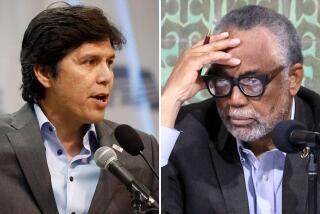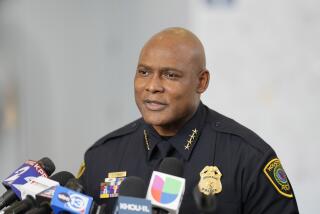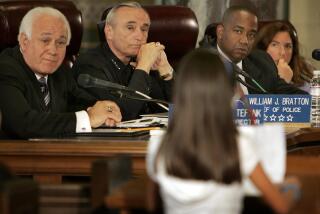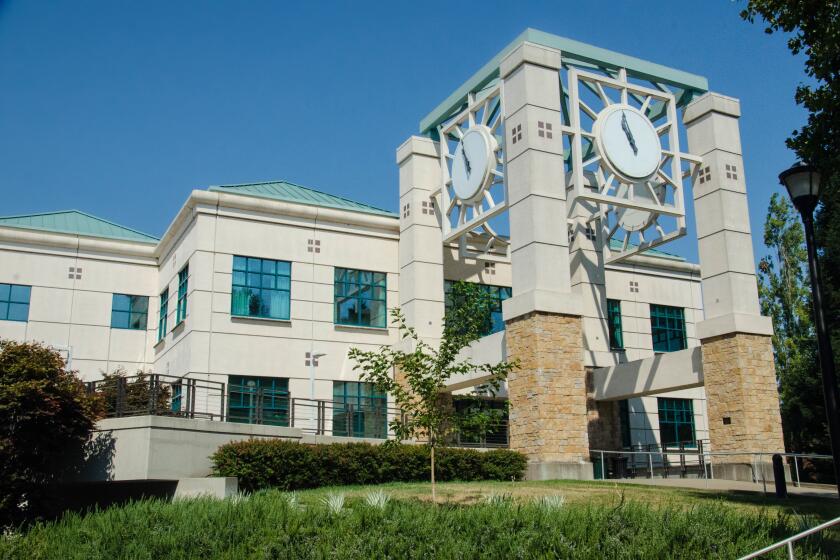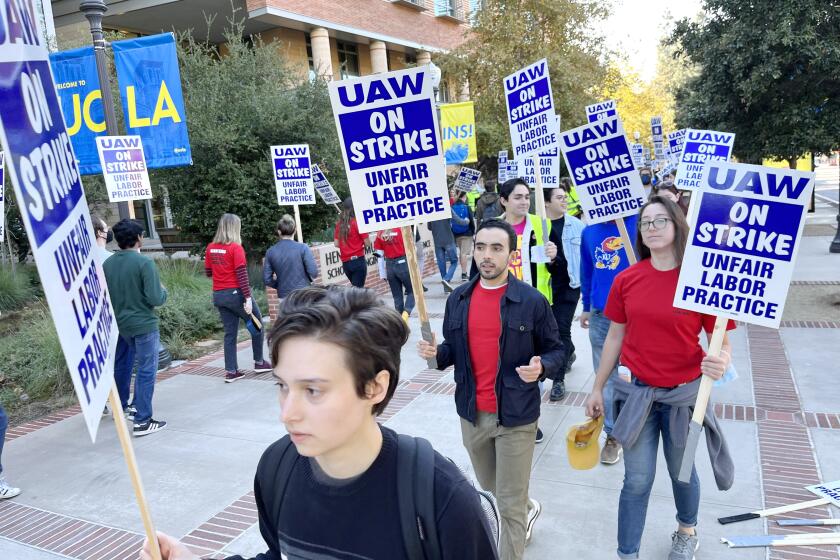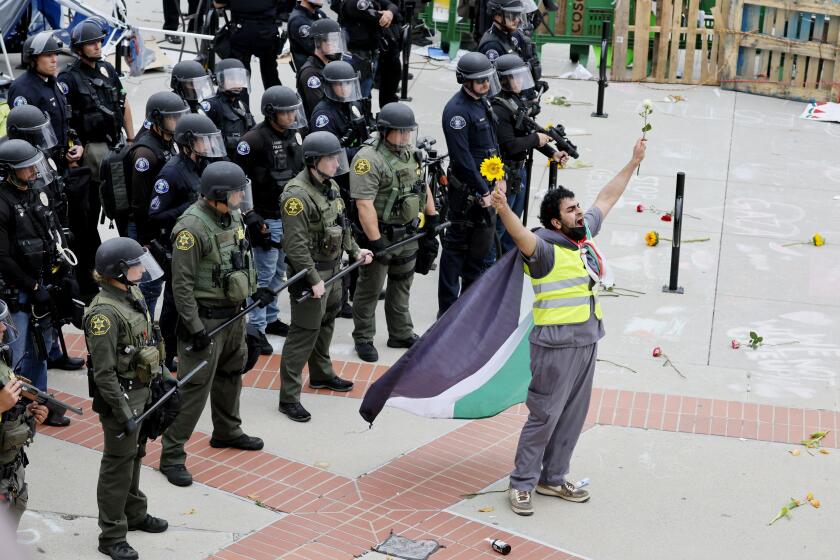Councilmen Told Gates Set to Leave : Police: Assistant Chief Dotson, who openly complained about the chief to the Christopher Commission, loses control over Internal Affairs.
Los Angles Police Chief Daryl F. Gates has told two members of the City Council that he will leave his post by the end of the year, sources close to the council said early today.
City Council President John Ferraro and Councilman Joel Wachs are scheduled to make the announcement at a press conference this morning, sources said.
Gates was expected to leave the city for a trip to North Carolina today and not attend the press conference, sources said.
Earlier, Gates had stripped an assistant police chief who criticized the chief’s record in disciplining officers of command of the LAPD unit that investigates the department’s most serious allegations of excessive force.
A clearly upset Gates notified David D. Dotson on Wednesday that Dotson would no longer oversee the Internal Affairs Division.
Gates’ action came one day after the Christopher Commission released its report on use of excessive force by the LAPD. In that report, Dotson--who is considered a leading candidate to eventually replace the 64-year-old Gates--described the LAPD under Gates as having “failed miserably” in policing itself.
Dotson was joined in his criticism by former Assistant Chief Jesse A. Brewer, who told the Christopher Commission that Gates deserved a “D” grade for the way he disciplines officers, that the LAPD has collected intelligence information on elected officials, and that Assistant Chief Robert Vernon has promoted officers who either attend his church or share his fundamentalist Christian beliefs.
A spokesman for Gates said the decision to remove Internal Affairs from Dotson’s control was not intended to punish the 33-year police veteran, and Dotson himself questioned whether he was being disciplined.
“I do not at this point believe that I am in danger of retaliation,” he said. “I don’t know whether stripped is the right word. It (the Internal Affairs Division) has been transferred to report directly to the office of the chief of police. But I don’t know exactly what the mechanics are.”
Others, however, accused Gates of savaging Dotson.
In a written statement Thursday, Mayor Tom Bradley said: “It’s tragic that someone who simply told the truth is faced with this kind of heavy-handed intimidation. The findings of the Christopher Commission are based on the frank and honest observations of leaders inside and outside our Police Department.
“No one should suffer retaliation for being brave enough to tell the truth. I will work to ensure that all available laws are brought to bear to protect Assistant Chief Dave Dotson.”
Councilmen Michael Woo and Zev Yaroslavsky called for an investigation into the propriety of Gates’ move against Dotson. Woo said he plans to ask the city’s Ethics Commission to investigate whether Gates’ treatment of Dotson violates the “whistle-blower” provision of the ethics package approved by the voters last year. That provision prohibits retaliation against any city employee who reports wrongdoing, illegal acts or abuse of authority.
Stanley Sheinbaum, a member of the Los Angeles Board of Police Commissioners, questioned the propriety and timing of the move and said the board would investigate.
“One has to consider that the motivation for (Gates’) decision was his personal anger,” Sheinbaum said. “This will serve only to discourage other officers in the department from speaking out, especially when it is the proper moment to do so.”
Gates on Thursday stepped up his own campaign against Dotson, Brewer and any others who criticized his leadership. The chief, noting that he has a reputation for speaking his mind in public, questioned why the police managers did not raise their concerns to him earlier.
“At least I speak out,” Gates said. “I don’t hide behind closed doors.”
However, Dotson and Brewer both complained to the Christopher Commission that they had difficulty seeing Gates because of his busy schedule and protective secretary.
On Thursday, the Christopher Commission released full transcripts of Dotson’s comments as well as those of Gates, Brewer and Vernon.
The transcripts reveal that dissension and disagreement among the LAPD’s top brass in dealing with excessive force and other crucial issues is even greater than depicted in the commission’s landmark report made public Tuesday.
Dotson, for example, is quoted in transcripts as saying that “in the last 13 years in the Los Angeles Police Department--with a couple of very notable exceptions--we have not had, in my opinion, at the top, very effective leadership.”
Gates has been chief for 13 years.
Brewer, who oversaw administrative services in the department until he retired earlier this year, leveled equally pointed comments against his former boss.
Gates, Brewer said, “has done, I’d say, overall a good job.” But he also added:
“There are some areas where I find flaws. I would not give him a good grade in his handling of discipline. I would probably give him a D. I think I would be generous in giving him a D in discipline because I felt the way he handled discipline was really not for the best for the department, nor for the people of the city.”
He said Gates was “very light in discipline” and that Gates seemed more bothered by internal policy infractions than allegations of serious misconduct.
“I thought people should be held more accountable, not only for their own misconduct, but also for their own subordinates who reported directly to them.”
Brewer was particularly critical of Vernon, calling him “the head of the God Squad” and saying that “it’s commonly known that the way you get ahead as far as Vernon is concerned is to become aligned either with his church or to profess that you are born again.”
Further, he described Vernon as “devious” and one who “tries to run the department.”
“He gets into my business, he gets into Chief Dotson’s business and we always have to say, you know, ‘Mind your own business, Bob.’ ”
Asked to gauge Vernon’s effectiveness, Brewer said: “I would say Chief Vernon should not be in the Office of Operations. . . . In fact, he probably should be gone.”
Of former Deputy Chief William Rathburn, who left earlier this year to head up the Dallas Police Department, Brewer said: “Many people thought that when Rathburn left, that it really created a vacuum. But I didn’t think too much of Rathburn.”
He said that the assistant chiefs would sometimes commiserate about public statements Gates made that they felt were embarrassing to some segments of the public. “It is my belief,” he said, “that those kinds of statements do project the wrong message to the people in the department.”
Brewer also recalled that the department has kept intelligence files on elected officials.
“I do know of elected officials who have run afoul of the law and that the department is aware of,” he said. “I don’t know what kind of investigation has taken place. Whether any investigation has taken place at all.
“But I think we are privy to a lot of information that is not necessarily positive about a lot of people. . . .”
Asked what kind of information the police had collected, Brewer said it covered “drug usage.”
In 2 1/2 hours of rambling testimony before the commission, Gates himself depicted his department as a leader in American law enforcement and took personal credit for implementing many innovative policies and techniques, transcripts show.
Responding to commissioners’ questions, Gates expressed concern over racist messages transmitted by some officers on police car computer terminals, rejected the notion of allowing officers to use the chokehold on suspects as they once did before it was banned, and suggested that officers be retested regularly to determine their psychological health.
Commissioners made little attempt to be confrontational, the transcripts show.
“We understand the record that you have, the esteem with which you are held in around the country,” Chairman Warren Christopher told Gates, “and so we do this in a spirit of collegiality on what we know is a very difficult issue for all of us.”
The transcripts show that Dotson, 58, was hardly collegial in his assessment of Gates.
As head of the department’s Office of Administrative Services, Dotson, among other functions, oversees police personnel and training, the LAPD’s fiscal support bureau and, until this week, the Internal Affairs Division.
He expressed personal admiration and loyalty to Gates, and conceded that many of the problems were of his own making. But he also made it clear that the department’s disciplinary system is weak, that Gates is often distracted and inaccessible, and that many of the chief’s public comments about minorities have encouraged rank-and-file officers “to believe that there are different classes of people that can be treated in different ways.”
In closing his hourlong session with the commission on June 14, Dotson appeared to be speaking from the heart when he said:
“This was a rare opportunity for me, and I let it all hang out, whether I should have or not.”
From there, his words were quite direct.
“We have a big policy manual full of high-sounding statements of purpose, and so on and so forth, and how we should treat people, and what it is that we’re supposed to be doing, what our role is in modern society and all that,” he said.
“But that stays in the policy manual and is not reflected in our day-to-day operation and is not referred to daily or with any degree of regularity, and there is no clear statement of mission or purpose.”
Dotson and Brewer also criticized Gates for many of his public comments that have angered certain segments of society. Dotson recalled how Gates once agreed that women officers are just as effective as men, but then added: “But I really don’t think they belong out there.”
On discipline, Dotson said that managers often “tend to be so understanding that we think the minimum penalty is adequate because that’s what we expect of them (officers), to be very aggressive, to be very firm, to not take any guff.” As an example, he cited an officer involved in the 39th and Dalton raid, where apartments were vandalized by police officers, who was later transferred to the Foothill area and quickly became involved in an altercation in which he removed his Sam Browne belt and “head-butted” the man.
The officer was then given a desk job and then a detective assignment, where he was involved in an unlawful arrest and search. He next was placed in a jail security position, which further angered Dotson.
“There is no place I know of where, if you have a tendency toward abusing people, you can do it more easily in jail,” he said. But, “the management out there didn’t understand those kinds of sensitivities.”
On a radio talk show Wednesday, Gates berated Dotson, saying: “Here’s a man who’s been in charge of discipline for the last two years. We met on a regular basis. You’d think he would speak out. . . . I’ve never heard him say any of those things. It’s very disappointing. . . .”
Dotson in a telephone interview with The Times on Wednesday night disputed Gates’ claim.
“If the chief does not believe I raised these issues,” he said, “then we do not agree on that issue. I’ve always prided myself on being candid with the chief.”
Dotson revealed that he had met that day with Gates, and that the session had been less than “amenable.” It was during that meeting, apparently, that Gates informed Dotson that he was stripping him of the Internal Affairs Division.
Pressed further about his conversation with Gates, Dotson on Thursday said: “All I can tell you is we did have a meeting. It was a private meeting. The chief told me what his reasons were and I accept them at face value. But he will have to tell you that.”
But Dotson also defended his testimony to the commission. “The entire text of my remarks to the commission are now public and they say everything I said,” he said. “And they were said with the best interests of the department in mind.”
He joked that if the move by Gates was punitive “he’s relieved me of a tremendous workload. And I will have a good deal more time to devote to other aspects of my responsibilities.”
Declining to discuss the situation further, Dotson said, “We need to now let all of these remarks sink in (from the Christopher Commission’s investigation) and begin to turn down the heat, so to speak.”
Gates’ spokesman, Cmdr. Robert S. Gil, said that in removing the Internal Affairs Division from Dotson’s control the chief was merely seeking to conform to a Christopher Commission recommendation. The commission has proposed that Internal Affairs, to ensure its independence, be commanded by a deputy chief who reports directly to the chief’s office.
Gil said that Gates has appointed Cmdr. Rick Dinse to head the division.
“We don’t have a deputy chief available,” Gil said. “Until we can, Rick Dinse is in that position.” Dinse is also in charge of the LAPD’s Rodney King investigation.
“This may be the first of many moves; this may be the only move,” Gil said. “I don’t know what Chief Daryl Gates has in mind.”
The Christopher panel’s work, meanwhile, received strong support from business leaders on Thursday when Los Angeles Area Chamber of Commerce board members endorsed many of the commission’s recommendations dealing with Police Department reforms, including Gates’ retirement.
But the chamber board stopped short of calling on Gates to resign.
“Most of the board feels there should be an orderly transition process,” said Ray Remy, president of the chamber. “There is a sensitivity that the chamber should play a constructive role in the short-term and highly visible issue of the chief’s tenure, but not get dragged into the middle of a very difficult political debate by choosing one side or another and becoming more a part of the problem than part of the solution.”
The transcripts released by the Christopher Commission on Thursday also included comments by Vernon, who is director of operations and oversees 84% of the department’s functions. Vernon’s testimony centered on many of his religious views and was perhaps the most benign among transcripts released Thursday.
Vernon, who is a religious fundamentalist, focused on “right and wrong” issues that confront police officers and his pledge to keep his own secular views separate from his police work.
“I talk about things that are wrong or right,” he said. “I don’t think that’s being religious. I think we can agree on some basic morality. I think it’s wrong to use excessive force and I think we ought to say that.”
Times staff writers Glenn F. Bunting, Ashley Dunn, Fred Muir, Richard Serrano, Tracy Wilkinson and Tracy Wood contributed to this story
RELATED STORIES: A26, A32, B1
More to Read
Start your day right
Sign up for Essential California for news, features and recommendations from the L.A. Times and beyond in your inbox six days a week.
You may occasionally receive promotional content from the Los Angeles Times.
